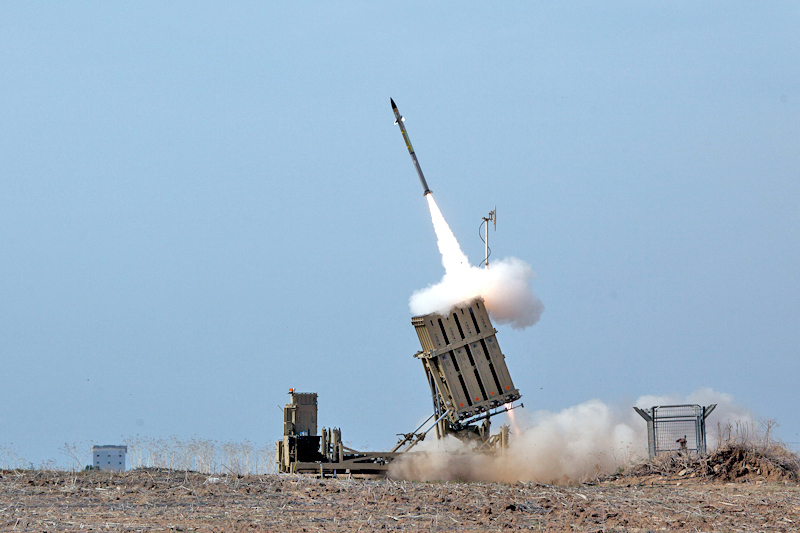Israel in August secured the most substantial foreign military sale in its history when it sold its Arrow-3 air defense system. The customer was not the United States or a neighboring country — it was Germany.
The purchase was historic not only for Israel, but for Germany, which reportedly has sought this system since Russia began its invasion of Ukraine. Germany is not the only NATO nation looking to Israel to help bolster its defenses. In the same month, the United States approved the sale of David’s Sling to Finland — a purchase that Finland began to pursue just one day after it joined the alliance.
These sales are possible not only because of Israel’s innovation, but also because of the steady support from the United States to Israel. Indeed, the Arrow-3 and David’s Sling are both jointly funded, developed, and produced by the United States and Israel. As I and former Secretary of Veterans Affairs Robert Wilkie noted, Israel “is a defense consumer that also contributes to U.S. and European deterrence efforts.”
But this view of Israel is facing intense pushback, not only from those ideologically opposed to Israel or those skeptical of foreign assistance altogether, but from those who insist that addressing the threat from China requires a complete shift in posture to the Pacific.
In more sophisticated policy jargon, this notion proposes that either Israel is strong enough to be independent of America’s support, or that today’s geopolitical landscape requires America to prioritize other theaters and allies.
One author, concerned that the United States is not “hyper-focused” enough on the threat from China, argued recently that the United States must abandon its “bear hug of Israel” by encouraging it to “defend itself autonomously” as U.S. forces turn their focus exclusively to East Asia.
More recently, presidential candidate Vivek Ramaswamy said that by 2028 “additional aid [to Israel] won’t be necessary in order to still have the kind of stability that we’d actually have in the Middle East by having Israel more integrated with its partners.”
Both these analyses reflect a basic misunderstanding of foreign policy. The former — articulated by a self-professed military strategist and China expert — is a grotesque misrepresentation of the threat from China, which is not restricted to one theater or domain. It also fails to understand the nature of U.S. military posture, which historically has been globally distributed, not only to prevent war, but also to maintain peace through the diplomatic value of bilateral military relationships with other nations. The latter view reflects a misunderstanding of history, in particular failing to understand that stability anywhere in the world depends on American engagement.
Both flawed positions also overlook the global opportunities for our allies to work together in facing strategic adversaries. In Europe, our allies’ focus on harnessing the latest military innovations is no less important than their stepping up to contribute monetarily to the alliance. Outside of the United States, only Israel can help these countries meet that need.
That is why Germany and Finland, two very different NATO allies, are eager to acquire Israel’s world-class equipment. They realize that Israeli weapons both support the security of the countries buying them, and also support Ukraine by allowing these countries to provide their older and surplus weapons to Kyiv.
Further, the war in Ukraine has exposed the grave state of the defense industrial base in the United States. The joint development and production of the Arrow 3 and David’s Sling can serve as a model for greater co-production of weaponry among the United States, Israel, and allies in Europe.
Our allies outside of Europe see this too. Last year, Japan and Israel marked 70 years of diplomatic ties with a defense agreement that included joint exercises and military technology. Earlier this year, Colombia purchased Israel’s Barak MX air defense system. Last year, Argentina acquired Hero-120 and Hero-30 explosive drones built by Israel’s Uvision. According to Forbes, Argentina thus became the “first Latin American country to purchase this series of drones.”
That nations outside the Middle East seek out Israel’s assistance to bolster their defense capabilities suggests Israel is quietly playing an essential role. No longer is Israel only a critical ally deterring Iran, our top regional adversary in the Middle East. It is certainly that, but it is much more.
Today, it is not hyperbole to state that the security of the United States and of its allies around the world depends on Israel. The country’s innovation, facilitated in part by the unwavering support of the United States, makes Israel indispensable to our allies as they modernize their capabilities to face the uniquely complex set of threats from China, Russia, and Iran.
As NATO grows stronger and more strategic in response to the Ukraine war, and as our allies in the Middle East brace themselves for new threats from Iran, all look to Israel for help.
In light of today’s threats and the global importance of Israel, there is a new case to be made for assistance to Israel – not only as a key ally in a region with a top adversary, but as a global player integral to Americans’ security and prosperity.
Jacob Olidort is Director of Research at the Jewish Institute for National Security of America (JINSA). A historian of the Middle East, he served as an advisor to two U.S. Senators and in the Office of the Vice President.

